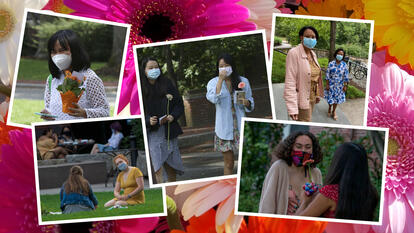
Discovering the Authors Behind Ancient Chinese Manuscripts: Meet New Professor Heng Du
Heng Du, Andrew W. Mellon assistant professor of Chinese at Wellesley, is one of several new faculty members the College welcomed in fall 2022. Du, who arrived on campus after a 2,500-plus-mile road trip from the University of Arizona, brings her expertise on pre-modern Chinese literature, history, and philosophy to Wellesley students. She is currently working on a book project dealing with the “paratext” of early Chinese writings. (Paratext is material that is separate from but connected to a published main text, such as the title, cover page, dedication, author note, acknowledgments, etc.) Her research interests include how the notion of individual authors emerged in early China and how they became represented and embodied by the texts they produced.
(To get to know other new professors who joined the Wellesley faculty in the fall, check out our Q&As with Erin Teich, Tyler Giles, and Anny-Claude Joseph.)
Mia Cadena: What was your path to Wellesley?
Heng Du: I always wanted to become an academic. The Wellesley position opened up, and it was an amazing fit from my perspective.
Cadena: What are some of your short- and long-term goals at Wellesley?
Du: Short term I’m excited to have a new set of colleagues and get to know the students. I have been sitting in on other colleagues’ classes to get a better sense of how the pedagogy works at Wellesley. In the long term, I have some ambitious ideas for research, teaching, and community building. I’m hoping to build a curriculum in pre-modern Chinese history and literature that introduces students to various interesting aspects of this discipline. I’m very interested in comparative studies and finding ways to collaborate with colleagues.
I visited the Book Arts Lab in Clapp Library, and we are starting to think about having a course on book culture in pre-modern China with lots of hands-on exercises with students, such as making scripts from bamboo in line with pre-modern Chinese traditions.
Cadena: If you could have dinner with anyone living or dead, who would it be?
Du: I recently had the great fortune to have dinner with Ruth Ozeki, an author I’m very enamored with. She gave the Jordan Lecture this year at the Suzy Newhouse Center for Humanities. So you could say my wish was granted. If not Ozeki, well, I work with early Chinese manuscripts, and a lot of the time we don’t know who is behind them. So I would love to be able to meet, ask them questions, and get to know them.
Cadena: What are your favorite spots on Wellesley’s campus?
Du: Long before I dreamed of working here, I visited Wellesley as a Ph.D. student for an Asian studies conference. I was just blown away by the campus’s impressive architecture and how the modern buildings are harmoniously part of the landscape and in concert with the other buildings.
Cadena: What are you reading or watching right now?
Du: I finished Ruth Ozeki’s new book The Book of Form and Emptiness and now I’m reading her novel The Tale for the Time Being, which is my fun book for the moment. For work, I’m reading so many things at once, but in between, I’ve also started the second season of The White Lotus.
Cadena: What would be the title of the book about your life?
Du: I attended [a meeting] for work where we had an exercise to imagine if we were a tree, thinking about what are our roots, our stems, and where we want to grow. It made me realize that I’ve actually been a tumbleweed my whole life. As a child of immigrants and an academic, you are moving a lot. My book would [be titled] something like When a Tumbleweed Learns to Be a Tree.



